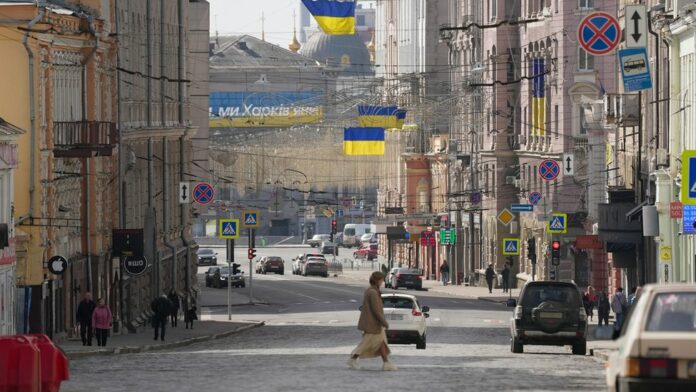In central Kharkiv you hear the rattle of generators on every street.
Ten days ago, Ukraine’s second city was plunged into darkness by a massive, targeted Russian missile attack on the energy system – it was the biggest since the start of the full-scale war.
As Kharkiv works to restore power, there has been a wave of additional strikes across the country targeting the energy supply.
Volodymyr Zelensky has condemned what he calls Russia’s “missile terror”.
The Ukrainian president has also renewed his calls to his country’s allies for more air defence systems as protection.
The authorities in Odesa on the Black Sea in the south of the country say the energy system there was the latest to be hit overnight, with missiles and drones, causing partial blackouts.
In Kharkiv to the north, the damage is more serious.
Kharkiv’s mayor, Igor Terekhov, has said it will take weeks to restore full supply and that is if Russia’s armed forces don’t strike the same targets again.
The initial attack on the city’s energy supply even knocked out the air raid siren. There is now a screeching noise that comes straight to people’s mobile phones instead.
There can be hours of those missile warnings in the city each day – during one on Saturday night, the blast wave from a strike blew out dozens of windows in a block of flats.
But the Russians have increasingly been aiming at the power grid.
“The damage is very serious,” Mr Terekhov told the BBC.
“We need time to repair it,” he added, suggesting that meant a couple more months at least.
Russia’s defence ministry confirms that its latest strikes have been focused on Ukraine’s power supply. It says the aim is to disrupt the work of the country’s defence industry and claims that “all aims of the strike were achieved”.
The ministry has a long history of disinformation.
But the Kharkiv mayor did tell the BBC that the city’s manufacturing sector, which requires significant power, has been affected by the blackouts. There are no further details.
Blackout periods
The impact on civilian life is more obvious.
Blackout periods have been introduced in order to conserve energy, and there is a schedule for the city. On Saturday those power cuts lasted six hours, but by Sunday they had been reduced to four hours.
The timings can slip.
“They were supposed to cut the power to my area at 09:00, so I got up especially early to charge everything,'” a friend messaged. “Then I got in the lift and got stuck. They’d cut the power early!”
A hair salon in a Kharkiv back street is one of many small businesses with a generator whirring noisily outside the door. On Saturday it was on for seven hours, allowing the salon to keep operating.
The same goes for cafés and companies throughout the city centre, although many have sheets of wood over their windows to cover a gap where the glass has already been shattered or to protect it from future blasts.
Some of the boards are painted with birds and flowers.
“We’ve been working on generator power since Monday,” salon owner Natalia told the BBC. “Of course it’s really hard, especially because we’re all women and when we finish work late at night it’s so dark!”
Russia has attacked Ukraine’s power grid before, in the first winter of the full-scale war.
As engineers scrambled to perform emergency repairs then, residents shivered in the dark in their homes or headed for central “invincibility points” for warmth and power.
Hope for a ‘quiet night’
It is much warmer now but the impact is still significant; when night falls, whole areas of Kharkiv remain pitch dark.
That affects people’s mood as much as it makes life awkward.
“The Russians have got new weapons,” a student called Liza worries, in one of Kharkiv’s central squares.
There’s a lot of chatter here about whether new, gliding bombs used by Moscow might bring even more devastation to Ukraine.
“People are depressed and thinking about leaving Kharkiv for a while. We notice that our army is struggling.”
The city authorities are determined to keep spirits up, as much as possible.
Within hours of the latest missile strike this weekend, dozens of workmen were clearing up the mess around the apartment block and sawing wood to seal windows.
The city metro is already running and electric trolleybuses and trams have been replaced by regular buses.
In Odesa, two districts were in partial blackout on Sunday morning. By early afternoon, power had been restored.
“A few days ago we had a total blackout, that was major,” Odesa resident Masha told the BBC. “Yesterday there were no traffic lights in the city centre and limited streetlights, to save power.”
On Sunday, she said, there were people out and about in town as usual. Officials say consumption restrictions have now been lifted all over the country.
When I asked Kharkiv salon owner Natalia whether she was worried by the latest attacks, she quoted her city’s reputation.
“We are invincible,” she joked.
She then wished us a “quiet night,” meaning one with without explosions.
In Kharkiv, nowadays, that is increasingly rare.


